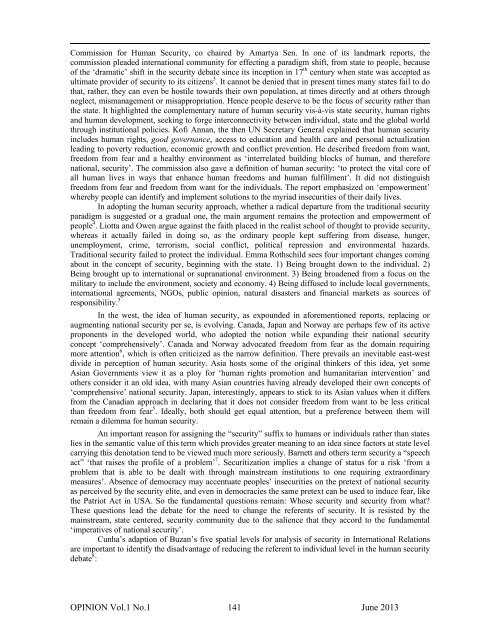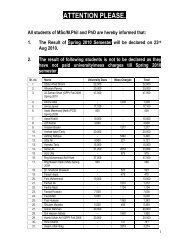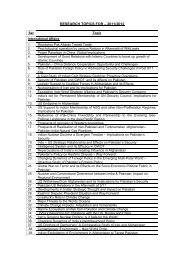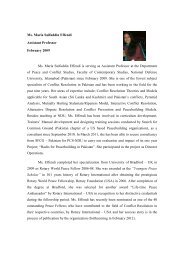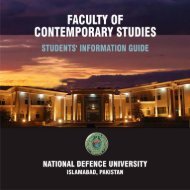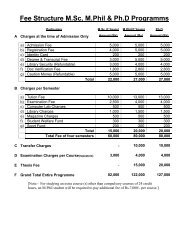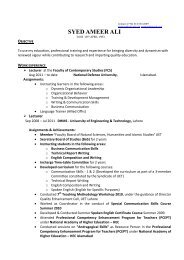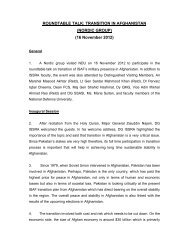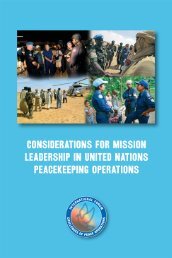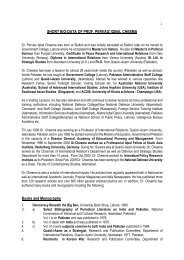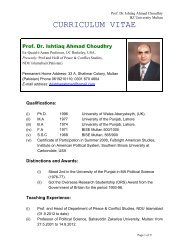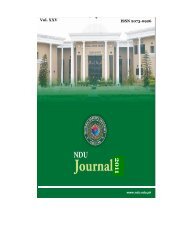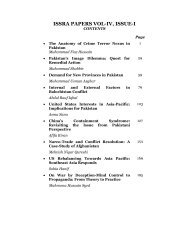OPINION Vol.1, No.1 June 2013 - National Defence University
OPINION Vol.1, No.1 June 2013 - National Defence University
OPINION Vol.1, No.1 June 2013 - National Defence University
Create successful ePaper yourself
Turn your PDF publications into a flip-book with our unique Google optimized e-Paper software.
Commission for Human Security, co chaired by Amartya Sen. In one of its landmark reports, the<br />
commission pleaded international community for effecting a paradigm shift, from state to people, because<br />
of the ‘dramatic’ shift in the security debate since its inception in 17 th century when state was accepted as<br />
ultimate provider of security to its citizens 3 . It cannot be denied that in present times many states fail to do<br />
that, rather, they can even be hostile towards their own population, at times directly and at others through<br />
neglect, mismanagement or misappropriation. Hence people deserve to be the focus of security rather than<br />
the state. It highlighted the complementary nature of human security vis-à-vis state security, human rights<br />
and human development, seeking to forge interconnectivity between individual, state and the global world<br />
through institutional policies. Kofi Annan, the then UN Secretary General explained that human security<br />
includes human rights, good governance, access to education and health care and personal actualization<br />
leading to poverty reduction, economic growth and conflict prevention. He described freedom from want,<br />
freedom from fear and a healthy environment as ‘interrelated building blocks of human, and therefore<br />
national, security’. The commission also gave a definition of human security: ‘to protect the vital core of<br />
all human lives in ways that enhance human freedoms and human fulfillment’. It did not distinguish<br />
freedom from fear and freedom from want for the individuals. The report emphasized on ‘empowerment’<br />
whereby people can identify and implement solutions to the myriad insecurities of their daily lives.<br />
In adopting the human security approach, whether a radical departure from the traditional security<br />
paradigm is suggested or a gradual one, the main argument remains the protection and empowerment of<br />
people 4 . Liotta and Owen argue against the faith placed in the realist school of thought to provide security,<br />
whereas it actually failed in doing so, as the ordinary people kept suffering from disease, hunger,<br />
unemployment, crime, terrorism, social conflict, political repression and environmental hazards.<br />
Traditional security failed to protect the individual. Emma Rothschild sees four important changes coming<br />
about in the concept of security, beginning with the state. 1) Being brought down to the individual. 2)<br />
Being brought up to international or supranational environment. 3) Being broadened from a focus on the<br />
military to include the environment, society and economy. 4) Being diffused to include local governments,<br />
international agreements, NGOs, public opinion, natural disasters and financial markets as sources of<br />
responsibility. 5<br />
In the west, the idea of human security, as expounded in aforementioned reports, replacing or<br />
augmenting national security per se, is evolving. Canada, Japan and Norway are perhaps few of its active<br />
proponents in the developed world, who adopted the notion while expanding their national security<br />
concept ‘comprehensively’. Canada and Norway advocated freedom from fear as the domain requiring<br />
more attention 6 , which is often criticized as the narrow definition. There prevails an inevitable east-west<br />
divide in perception of human security. Asia hosts some of the original thinkers of this idea, yet some<br />
Asian Governments view it as a ploy for ‘human rights promotion and humanitarian intervention’ and<br />
others consider it an old idea, with many Asian countries having already developed their own concepts of<br />
‘comprehensive’ national security. Japan, interestingly, appears to stick to its Asian values when it differs<br />
from the Canadian approach in declaring that it does not consider freedom from want to be less critical<br />
than freedom from fear 5 . Ideally, both should get equal attention, but a preference between them will<br />
remain a dilemma for human security.<br />
An important reason for assigning the “security” suffix to humans or individuals rather than states<br />
lies in the semantic value of this term which provides greater meaning to an idea since factors at state level<br />
carrying this denotation tend to be viewed much more seriously. Barnett and others term security a “speech<br />
act” ‘that raises the profile of a problem’ 7 . Securitization implies a change of status for a risk ‘from a<br />
problem that is able to be dealt with through mainstream institutions to one requiring extraordinary<br />
measures’. Absence of democracy may accentuate peoples’ insecurities on the pretext of national security<br />
as perceived by the security elite, and even in democracies the same pretext can be used to induce fear, like<br />
the Patriot Act in USA. So the fundamental questions remain: Whose security and security from what<br />
These questions lead the debate for the need to change the referents of security. It is resisted by the<br />
mainstream, state centered, security community due to the salience that they accord to the fundamental<br />
‘imperatives of national security’.<br />
Cunha’s adaption of Buzan’s five spatial levels for analysis of security in International Relations<br />
are important to identify the disadvantage of reducing the referent to individual level in the human security<br />
debate 8 :<br />
<strong>OPINION</strong> <strong>Vol.1</strong> <strong>No.1</strong> 141 <strong>June</strong> <strong>2013</strong>


